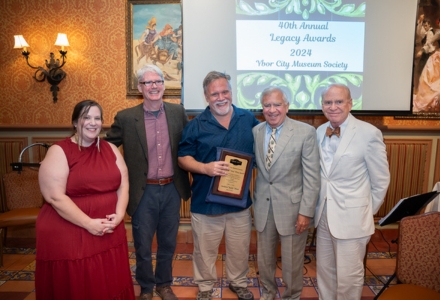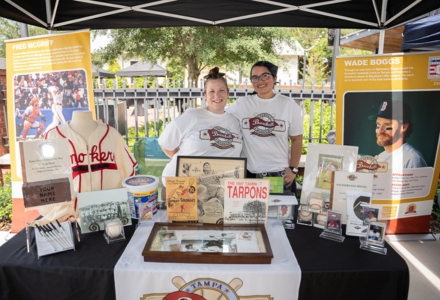Arminda Mata made a promise to her father shortly before he passed away, vowing to return to school and earn a degree in history. This commitment altered the course of her career, taking her from an intern at the Ybor City Museum Society to becoming the organization’s new CEO.
Mata graduated Suma Cum Laude with a bachelor's degree in history and a minor in anthropology at the USF Sarasota-Mantee campus. With encouragement from associate professor of history, Dr. Jonathan Scott Perry, she was motivated to pursue a graduate degree to further her education in the subject.

Arminda Mata (left) posed with USF librarian and Anthony “Tony” Pizzo Award recipient, Andy Huse (center) at the 40th Annual Legacy Award Ceremony for the Ybor City Museum Society. (Photo by Corey Lepak)
When Mata began her graduate program, she was somewhat apprehensive about pursuing her education later in life compared to her peers. This changed when she met Dr. Jennifer Knight, an associate professor in the department. Mata and Knight quickly formed a strong bond, sharing similar interests and finding common ground.
Knight acted as Mata's mentor and advisor, which proved invaluable during the height of the COVID-19 pandemic. Before returning to education, Mata had more than 20 years of experience in the banking industry. Looking to gain more hands-on experience in the field of history, Knight facilitated an internship opportunity for Mata.
“I started an internship program the first year with Tampa Bay History Center and then came to the Ybor City Museum Society. During my internship, I assisted in developing an education program, but my true goal in public history was to become a curator. After my internship, I came back and was hired as a contractor to do a curatorship,” Mata said.
The Ybor City Museum Society plays a key role in preserving and presenting Ybor City's extensive 135-year history. Through its programs, the society provides educational perspectives on how immigrants have influenced the city's cultural evolution since 1886, contributing to Tampa's vibrant cultural landscape today.
In 2021, Mata completed her master's degree in history and remained employed as a curator at the Ybor City Museum Society. When the CEO of the organization retired in December 2022, Mata's background in banking and deep understanding of the society made her a natural fit for the interim CEO role, which became a permanent role in October 2023.
“I knew this was an opportunity for me to show people what I could do. I accepted the role, and it has been an amazing experience because I get to do everything I love, such as teaching, managing the finances, hosting events, and planning new programs,” Mata said.
The Ybor City Museum Society has initiated numerous programs to conserve the city's history, including the Tampa Baseball Museum at the Al Lopez House, and the Rollin’ Through History Mobile Museum, which were spearheaded by Mata. Describing it as a “true labor of love,” Mata created the mobile museum initiative after noticing a gap within the community.
“I started hearing more and more people who didn't know the museum existed. The pandemic changed so many things, and while we were out presenting to a senior citizen facility, we thought, ‘How awesome would this be if we get this out to the public and teach them about our history free of charge?’ It provided us with the opportunity to engage with the community, connecting us to the past and to each other, while offering a more enriching experience than a brief 15 or 20-minute visit to a museum,” Mata said.
In addition to leading new initiatives for the society, Mata is also a strong advocate for USF, frequently taking on interns from the Department of History. She often hires USF students to help launch their careers in the field of public history. This summer, two USF student interns, Rose Lopez and Matthew Lewicki, will be joining as paid employees.
Lopez, a recent history graduate with a minor in classics and anthropology, joined as a volunteer with the Ybor City Museum Society last year and is currently pursuing her master’s in library and information sciences while working under Mata’s mentorship.
“I currently work as an archivist for the museum. I'm working on restructuring the archives and making sure that they can be used in the future. I'm also doing a small bit of digitization work for their archives so I'm scanning some things, making sure that people who can't come to see the archives in person, or if we ever want to share them more widely with the public, can still view those important pieces of history,” Lopez explained. “I think part of the reason I enjoy working with Arminda so much is because she is so caring. She truly cares that we have the skills and the experience we need for our careers. She's so focused on helping us learn about the history of Ybor City so that we can share it with others.”
After earning her master's degree, Lopez plans to pursue a doctorate in history as well as museumships and curatorial studies. She aims to make museums more accessible to those unable to leave their homes, driven by her own experience as a disabled individual.
Lewicki is also a recent graduate who earned a bachelor's in history with minors in queer and sexuality studies and urban studies. Similar to Lopez, he began his internship with the Ybor City Museum Society in January and will transition to a paid position for the summer.
“In my time with the society, I've done research on the architectural history of buildings in Ybor City. I've worked with my fellow staff members in planning events such as our annual Buildings Alive! event, including architectural research, logistical tasks like planning a route for the trolleys, and getting supplies ready,” Lewicki said.

Arminda Mata (left) and Rose Lopez (right) working at the Ybor City Museum Society's Rollin’ Through History Mobile Museum. (Photo by Corey Lepak)
Lewicki described his internship as a diverse experience that has "expanded the breadth of what I am capable of doing as a historian." Initially drawn to the field for superficial reasons, Lewicki's experience deepened his love for the subject and sparked an interest in specializing in both immigration and LGBTQ+ history.
“Working here on staff has taught me that you can do museum work and still maintain yourself as part of the community. As somebody who seeks to continue my pursuits in academic history, a big problem with academic historians is they often lose touch with the communities that they are studying or writing about. I've had an excellent example of how to do community-based work and have the honor to work with the lovely individuals that I do,” Lewicki said.
Mata's appointment as the CEO of the Ybor City Museum Society is seen as a "full circle moment" for her, evoking memories of the promise she made to her father. As a mother, mentor, and USF alumna, Mata reflects on her own academic journey and that of aspiring historians.
“USF has such a diverse group of teachers, faculty members, and students that I felt at home. I loved my teachers like Dr. Knight, Dr. Perry, Dr. Benadusi, Dr. Fontaine, and all of those wonderful people who not only inspired me but were my friends. USF believes in community as much as I do and we hope to continue that progress and be a place that uplifts young people to get their start,” Mata explained.
“Education is a wonderful thing because it's the one thing that people can't take away from you. I want to especially encourage graduate students, because being a graduate student can be very hard. I was a graduate student during the pandemic with a 21-year-old and a seven-year-old. I had a job, an internship, and I went to school full-time. It may seem impossible, but it's not. Remember to focus, work hard, and believe in yourself.”
The Ybor City Museum Society celebrated its 40th annual Legacy Awards, recognizing outstanding contributions from society members. USF librarian Andy Huse received the Anthony “Tony” Pizzo Award, through a nomination by another USF librarian, Matt Knight.
To learn more about Arminda Mata’s work, visit the website of the Ybor City Museum Society.